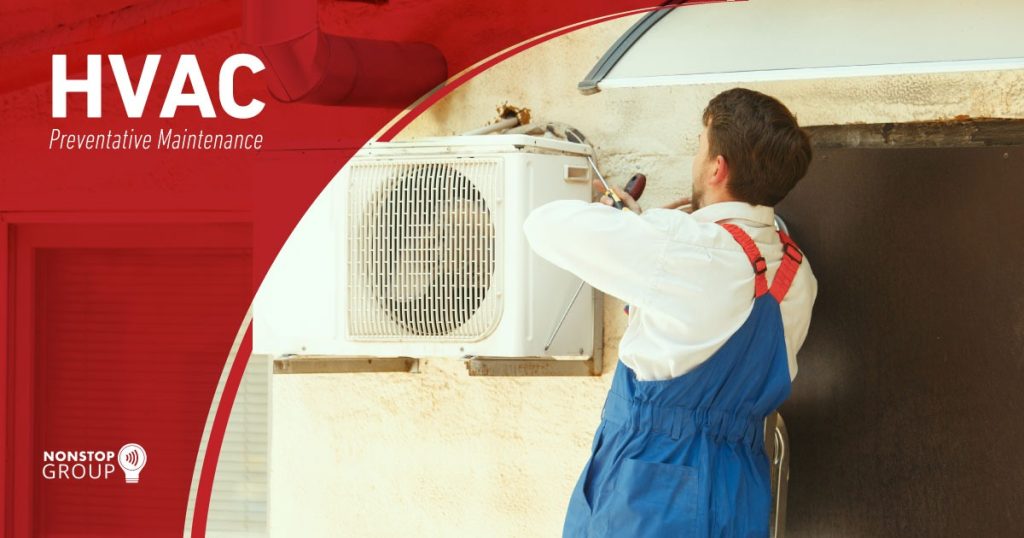6 Min Read
HVAC systems play a vital role in maintaining the temperature of a commercial or residential space. However, most people don’t realize that these systems need regular maintenance in order to function properly. Neglecting to properly care for your HVAC system can lead to decreased efficiency and even complete system failure. Taking some preventive measures now can save you time and money in the future.
This guide will help you understand the importance of HVAC preventive maintenance, and provide you with some tips and tricks to keep your system running smoothly.
Stick around!
HVAC Systems and HVAC Preventive Maintenance
HVAC — “Heating, Ventilation, Air Conditioning” — is a functional combination of various technologies to ensure a desirable temperature in an enclosed expanse. It is a reliable and efficient service that controls the air quality, humidity, and purity. Consequently, the occupants enjoy thermal comfort in a commercial or residential space.
HVAC systems are delicate and, as such, require preventive maintenance in order to function at maximum efficiency. By carrying out regular maintenance tasks, any issues with the system can be identified and rectified before they cause significant problems.
Hence, the chances of a system catastrophe are greatly reduced.
3 Major HVAC Preventive Maintenance Categories

The HVAC system must be regularly serviced to ensure optimal performance and prevent unexpected failures. This system is carefully distributed into three main categories. These categories translate into three critical steps and help formulate a preventative maintenance plan. Enlisted below are the categories that technicians and equipment owners must consider while performing HVAC preventive maintenance:
General Service Checks:
General service checks are mandatory and must inspect ductwork, electrical lines, and other facility infrastructure.
The Heating Equipment:
Heating equipment, such as furnaces, boilers, heat exchangers, and blower motors, must be regularly inspected and serviced. These systems are typically energized with gas, electricity, and oil, so it is critical to check for issues and replace parts as needed.
The Cooling System:
Cooling equipment, such as roof-top units (RTUs), must also be regularly serviced. RTUs contain coils that are comprised of refrigerant, and these need to be checked for proper operation.
Smarter Asset Tracking With NFC Tags
Learn more about how NonStop Suite's NFC Asset Tracking Solution can help your Enterprise streamline operations to new heights.
Get A Free Product Tour
Why Should You Perform HVAC Preventive Maintenance
The importance of HVAC maintenance should not be overlooked as it is crucial in ensuring your system remains up and running smoothly. Below are 7 tangible benefits that make preventive maintenance an absolute necessity for your HVAC system:
Bid Farewell to Costly Breakdowns:
By regularly servicing your HVAC system, you can identify potential problems before they lead to costly breakdowns. This helps to reduce the risk of system failure, and as a result, lowers your repair bills.
Enjoy Improved Air Quality:
One of the key functions of an HVAC system is to filter the air and provide improved indoor air quality. If you don’t clean the mold and dust accumulation on (and in) your equipment, you will never be able to enjoy that fresh breeze. Furthermore, if you or your family members suffer from air allergies (pollen allergy), asthma, etc., it is even more important to take preventive measures.
Takeaway: Always take preventive measures and keep your HVAC units tidy and clean.
Turn Down The Environmental Footprint
HVAC equipment consumes energizers which can be harmful to the environment. For instance, ACs use refrigerants and electricity that negatively impact the ozone layer. By ensuring your HVAC units are regularly serviced by a professional, you can reduce their energy consumption and do your part in protecting the environment.
Extend the Life Span of your Heating and Cooling system
With proper maintenance, your HVAC system can last up to 30 years. However, if you neglect your system, it is likely that it will not survive until its average life expectancy, and you will end up having to replace it within 20 years.
Reduce Your Energy Bills
If not maintained properly, your HVAC system will use more heat, energy, and resources. This increase in energy consumption not only hurts the environment, but also sums up to higher energy bills. A study shows that most families in the US spend as much as $2,000 yearly on energy bills, with half of that going towards keeping the house cool or warm. The best advice is to act wisely and plan scheduled HVAC maintenance in order to avoid those hefty energy bills.
Protect Yourself, Your Family, & Your Workplace
A neglected HVAC unit only elevates the potential risks of a catastrophe. Think of a short circuit, a gas leak, or a fire breaking out in your home or office. No one would want to endanger human lives leaving these potential risks unresolved. A preventative maintenance plan helps you subside these dangers and guarantee greater protection.
Keep Your HVAC System Under Warranty:
HVAC systems typically come with a certain warranty. However, this warranty is only claimable if the HVAC system is regularly serviced. If you don’t service your system at the ideal interval, your warranty claim won’t hold any weight
Your Masterplan For Optimal HVAC Preventive Maintenance

HVAC tune-up involves carefully examining and maintaining all the moving parts, including the refrigerant charge, condenser, evaporator coils, condensate drain, etc.
This is typically done by a contractor as part of a preventative maintenance contract. However, you can use this checklist to make sure that the contractor is efficiently carrying out the maintenance process.
Pro Tip: Take advantage of the NonStop Group’s electronic forms to automate your maintenance checklists and efficiently supervise the maintenance process.
Residential HVAC Preventative Maintenance Checklist
Most people are not well-educated about the HVAC maintenance of their homes. If you are on your way to inspect your residential HVAC preventive maintenance, keep the following checklist at hand.
Air Conditioner (AC) Maintenance Checklist for Spring & Summer:
⦁ Check that the fan motor is functional.
⦁ Inspect the HVAC cabinet for leakages.
⦁ Tidy up the evaporator coils and condensers.
⦁ Clean all the filters or replace them if needed.
⦁ Check and clean the outdoor unit from debris.
⦁ Verify that the HVAC cabinet door is carefully closed.
⦁ Pulleys and belts that are worn out should be replaced.
⦁ Oil/grease the moving parts to prevent them from rusting.
⦁ Keep ducts clean by inspecting them for dust, mold, or debris.
⦁ Maintain the clearance of your drain lines and clear the clogs.
⦁ Be sure to check thermostats and other controls for accuracy.
⦁ Maintain sufficient airflow by examining the blowers and blades.
⦁ Make sure drain pans are free of standing water to avoid overflows.
⦁ Check the refrigerant charge and scan for leaks if the charge is low.
⦁ Check if the batteries are working fine and replace them if necessary.
⦁ Inspect all the connections and the electrical system and ensure they are intact.
Heating Maintenance Checklist for Winter & Fall:
⦁ Scan the heat pump.
⦁ Investigate the gas pressure.
⦁ Change the disfigured belts and pulleys.
⦁ Look for any gas leaks in your gas furnace.
⦁ Carefully inspect the ignition burner assembly.
⦁ Grease all the moving parts for a smooth flow.
⦁ Clean and eliminate the clogs in your drain lines and pans.
⦁ Check your heating components or a heat exchanger for any damage.
⦁ Inspect the thermostats and controls for accurate temperature settings.
⦁ Carefully scan the wiring and electrical connections to avoid any electrical hazards.
⦁ Ascertain that the flue system is securely attached to the furnace and has a good seal.
⦁ Clean or replace your filters every month; don’t delay this task any further than three months.
Commercial HVAC Maintenance Checklist
Preventative maintenance for commercial HVAC systems is important to keep them running properly and extend their lifespan. Different tasks are performed based on the size, age, and condition of the system. An HVAC technician will analyze your system and perform the necessary preventative maintenance tasks. Some common tasks that your commercial HVAC preventative maintenance should cover are as follows.
Maintenance Checklist for Spring & Summer For Air Conditioners:
⦁ Ascertain adequate airflow of your air conditioning system
⦁ Lubricate all the moving parts.
⦁ Scan the filters and replace them if needed.
⦁ Tidy up the condensers and evaporator coils.
⦁ Inspect the operation of the fan and blower motor.
⦁ Inspect the belts and pulleys and change them if needed.
⦁ Inspect the performance of thermostats and other controls.
⦁ Clear the clogs and clean the drain lines and pans of standing water.
⦁ Carefully check the electrical connections and ensure they are intact.
⦁ Check refrigerant charge – inspect for any leakage if the charge is low.
Heating Maintenance Checklist for Winter & Fall:
⦁ Examine the heat exchanger.
⦁ Lubricate all the moving parts.
⦁ Check the ignition and burner assembly.
⦁ Clear the clogs in the drain lines and pans.
⦁ Verify that the belts and pulleys are in shape; replace them if frayed.
⦁ Ensure the fan and blower motor is working fine; adjust if needed.
⦁ Clean the filters on heating equipment or change the filters if necessary.
⦁ Ascertain that all the electrical connections and wirings are intact – no damage or breakage.
⦁ Assess the operation of thermostats and other controls to ensure accurate temperature.
Wrapping Up!
Preventive maintenance is a worthy consideration to protect your HVAC system’s life. However, the maintenance process is tedious and complex — unless you deploy an efficient and innovative Enterprise Asset Management (EAM) software.
At The NonStop Group, we offer electronic forms that are much simpler and more efficient than traditional paper forms. This software allows you to create, correspond, and track your maintenance checklists in real-time. Plus, with the dynamic data-sharing platform, you can easily regulate the preventive maintenance workflow. We’ve also introduced the NFC tagging system, which allows you to quickly scan the tag attached to the HVAC equipment and see its maintenance history. This is a great way to stay on top of your HVAC maintenance goals and objectives. If you want to streamline the HVAC preventive maintenance process, contact the NonStop Group today!


